Venture Bros: “The Terrible Secret of Turtle Bay” part 1
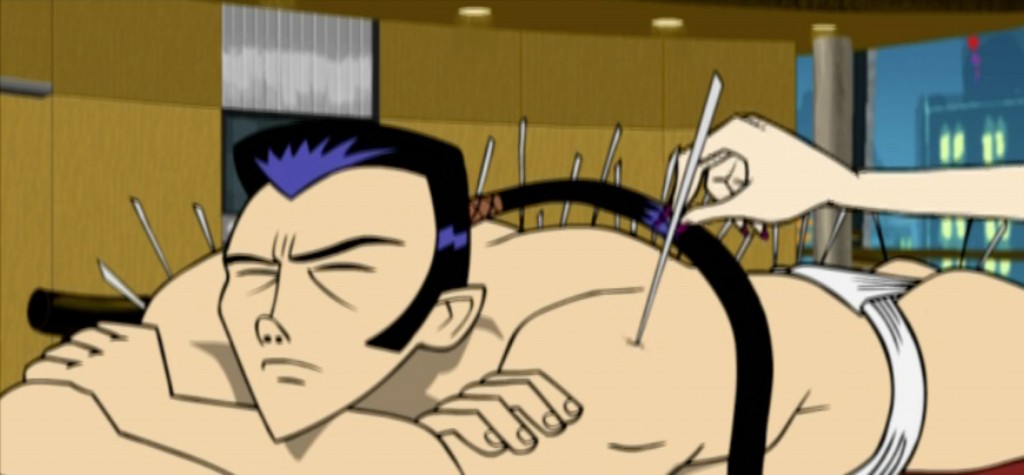
My analysis of The Venture Bros fell behind with Season 4. As Season 5 gears up, I’m going to rectify that, but I’m also going to go back and look at Season 1, starting with the pilot, “The Terrible Secret of Turtle Bay.”
A pilot episode is a tricky thing. The intent is to introduce the viewer to the world of the show, but too many pilots err too far on the side of introduction. The narrative of a pilot script often pauses too many times to introduce a character or an element, slowing things down and feeling, essentially, too much like a movie and not enough like a TV show. The desired effect of a pilot is have it feel like a mid-season episode: that’s when television works best, when the world has already been established and characters can groove on each other instead of introducing themselves.
The “A” story of “Turtle Bay” is: Dr. Venture is brings his latest invention to some sort of UN conference of famous inventors. (You’d think the UN would be wary of inventors’ conventions after the “United World Security Council” got dehydrated during the 1966 Batman: The Movie debacle.) The “B” story is: Hank and Dean Venture tag along with their famous father, get lost in NYC and tangle with the Monarch.
But the episode opens with the Bad Guy Plot. The Bad Guy for this episode is a Japanese guy named Otaku Senzuri. What does Senzuri want? That, it turns out, is the “terrible secret” of the title, although the answer to the riddle is contained right in the Bad Guy’s name: Otaku Senzuri means, essentially, “geek masturbation.”
Senzuri is a ninja. A wealthy ninja, apparently, who has a huge modern apartment in a Tokyo high-rise and employs both a sexy young acupuncturist and a henchman, Kikai. Kikai (which means “tool”) is, apparently, disposable – no sooner does he set the plot into motion by alerting Senzuri of Dr. Venture’s new invention than Senzuri attempts to kill him by hurtling a handful of acupuncture needles at him. This is a key moment for Senzuri, because his murder attempt not only fails, but actually removes a kink in Kikai’s shoulder and cures him of his desire to smoke. It’s rare that The Venture Bros pulls its punch when dealing with a murderous villain, and in this case it points to character: Senzuri is a terrible ninja, and while he has removed Kikai’s kink, his own kinks are just beginning to come to the surface.
Kikai’s newspaper headline also keys us into an important plot point: Dr. Venture is referred to as “SON OF RENOWNED SCIENTIST.” Obviously he has yet to make a name for himself
This “Bad Guy Intro” sequence (which is set in widescreen to separate it stylistically from the rest of the show – the villains live in a movie while the Ventures live on TV) leads into the title sequence, a gorgeous Saul Bass pastiche set to a hysterically intense, intrigue-filled score. It’s like Hitchcock hopped up on acid, or speed. The title sequence places the show in a context that mere design cannot. Like most of the show’s design, it hearkens back to the 1960s and sets the show’s peculiar tone: of the present day, but not in it. The Venture Bros is a show about people who live in the past. “The past” hovers over every aspect of the show: the characters live in it, wallow in it, retreat to it or struggle to escape its hold. It’s like The Great Gatsby filtered through Jonny Quest. No one on the show is immune from the pull of the past, even the children, even the title characters. If The Venture Bros is about the Venture Bros, then it’s a show about how children suffer under the control of the people in their lives who cannot escape their pasts.
And look! Here they are now, Hank and Dean, the titular siblings, out on their hoverbikes (with the plastic baskets with the daisy appliques), searching the Venture compound for their dog Scamp. What do Hank and Dean want? The answer is: “nothing important.” Even though the show is named after them, the desires of Hank and Dean are almost totally irrelevant to the scheme of The Venture Bros. Hank and Dean are excellent examples of characters who believe themselves to be the protagonists of their stories, when in fact they are supporting characters in other peoples’ stories. In fact, in large part they are obstacles to the other characters, inconveniences. Their father doesn’t love them and their bodyguard would rather be doing almost anything else. Even the supervillains of the show would rather not have to deal with them. Whatever the Venture Bros want, it is almost always irrelevant to the main plot of the episode.
Next we meet Brock, Dr. Venture’s bodyguard. What does Brock want? “To do his job,” I’d say – he doesn’t seem to care that much about Dr. Venture, and certainly not about the boys, but neither does he complain about his lot. When we meet him he’s washing down the X-1 in his cutoffs. Brock is one of the few characters on the show who is oddly over-qualified for his job and over-matched for the tasks set before him. A man of action, nothing fazes him, not an live mummy or a giant alligator. Like Steve McQueen, he minds his business and gets on with things.
Finally, we meet Dr. Venture, the protagonist of the piece. Dr. Venture, we’ve already learned, lives in his father’s shadow. But it’s worse than that, he actually lives in his father’s house and works in his father’s lab. The statue at the entrance to the Venture compound shows Rusty’s father holding him aloft and pointing heroically toward the future, but it serves only to keep him a child in his father’s arms. It defines him, and while the statue is meant to point Rusty to the the future, it’s guaranteed that he lives in the past.
At the moment, Rusty wants only Brock’s approval; he’s excited about a discovery he’s made in regards to the last mission. Brock fumfers before he admits “I don’t care.” So we see that Brock is not Rusty’s bodyguard by choice, it is an assignment, which is an important distinction, especially where children are involved. How can one strive to protect when one has no love for one’s charges? But Rusty’s goal for the episode is, unsurprisingly, “to escape his father’s shadow.” He’s taking a new invention to the UN, before the world’s best scientists, so that everyone can see that he is his own man, or at least that he’s lived up to his father’s image.
For the moment though, his narrative function is to short-circuit Hank and Dean’s narrative. He’s got Scamp the missing dog, he’s experimented on it and removed its skin as part of a contract for a makeup firm. Rusty’s kind of science is the worst kind: amoral and chasing after profit. It is, in fact, hard to think of a more amoral character than Rusty Venture, a man who will use his sons’ dog for experiments, take his sons kidneys without their permission and use “an orphan” as a part of a new contraption. He’s an antihero’s antiheroand his fumbling, fallible, fatal attempts at fatherhood form the show’s emotional spine.
Rusty, Hank and Dean go to the X-1 hangar to find Brock beating up (or, rather, killing) a mummy that had stowed away on the plane, which allows the episode to introduce another of its key components: extreme violence. In its collision of fantasy and reality, the violence on the show is both brutally funny and sharply discomforting; Brock isn’t just good at his job, he’s a seething cauldron of rage when it comes to bad guys, and he never passes up an opportunity to dispatch enemies with extreme brutality. His violence is, like his qualifications, far beyond what the situation calls for. Violence has, of course, always been a part of “boys’ adventure” stories (usually called “action”), and The Venture Bros holds that tradition’s fee to the fire, putting Brock in charge of the boys and forcing them to witness his bloodthirstiness. Brock is, like Rusty, a broken man, not physically broken but spiritually, as amoral with his violence as Rusty is with his science.
After the death of the mummy (who it turns out was not a mummy but a guy dressed as one, Scooby-Doo-like) Rusty tries to engage Brock in some more team-building repartee, But Brock walks away without comment. Rusty, we see, still clings to the notion of the boys’-adventure ethos, where quips are made and high-fives are given after adventures. Hank and Dean, of course, still live openly in that fantasy, but Rusty’s hopes, we see, quickly dim as his relationship with Brock turns tetchy and short.
Lastly, we meet a secondary villain, The Monarch. The Monarch, of course, will emerge in later episodes as Dr. Venture’s main arch-rival, but for this episode he takes a narrative back seat to Senzuri. The Monarch is Rusty’s natural match, as much of a failure in villainy as Rusty is in science. The Monarch’s master plan for this episode is to launch a fake meteor into the Venture compound, then have men jump out of the meteor and kill Rusty. The Monarch’s scheme gets no further than Hank and Dean’s search for Scamp; it is short-circuited before it begins when the meteor lands in the Venture compound concurrent with Rusty and gang leaving in the X-1 for New York. Rusty’s scientific curiosity, even the face of a meteor landing in his back yard, is trumped by his driving need to show everyone that he is his own man. The Monarch’s men are left trapped in the meteor, presumably to die.
The X-1 lands in front of the UN (Rusty tells Hank and Dean to stay on the plane, short-circuiting another potential adventure) and before long Brock is attacked by a second stowaway, this time a crocodile, but soon we get to the main event of the narrative, the UN inventors’ convention. Rusty sends Brock to take the boys to the hotel and we see that Senzuri, now dressed in full ninja, is spying on our protagonist. Poorly, as he’s clearly visible to everyone in the room. We’re told he represents “the Onani Corporation of Japan” (Onan being the Biblical “spiller of seed,” and thus the patron saint of masturbators) giving us further clue to his agenda.
Finally, Act I closes with The Monarch, in full Monarch costume, on a commercial plane to New York, presumably picking up his mission where it failed before, to kill Dr. Venture. So, as of the end of Act I, we’ve been given an “A” plot and two unrelated Bad Guy plots, an unusual structure for a 22-minute show. But The Venture Bros uses upending of convention (and frustration of expectations) as its narrative currency.
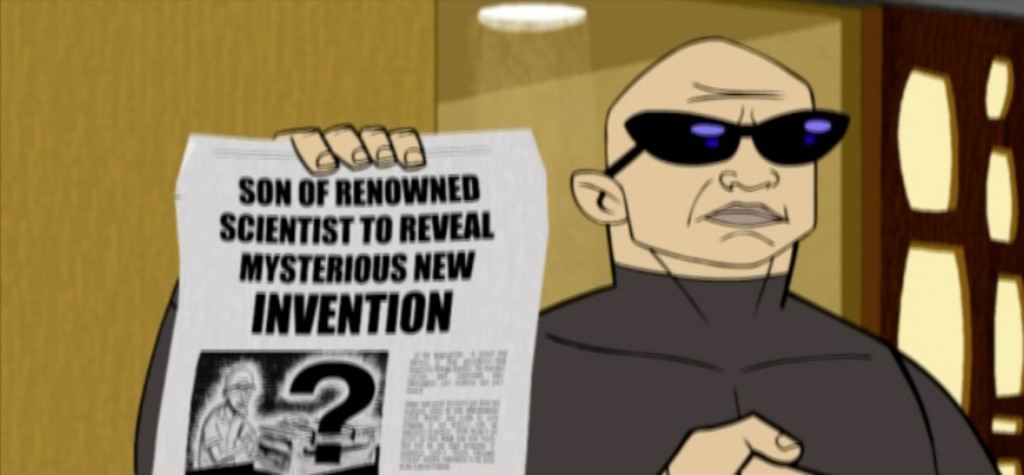
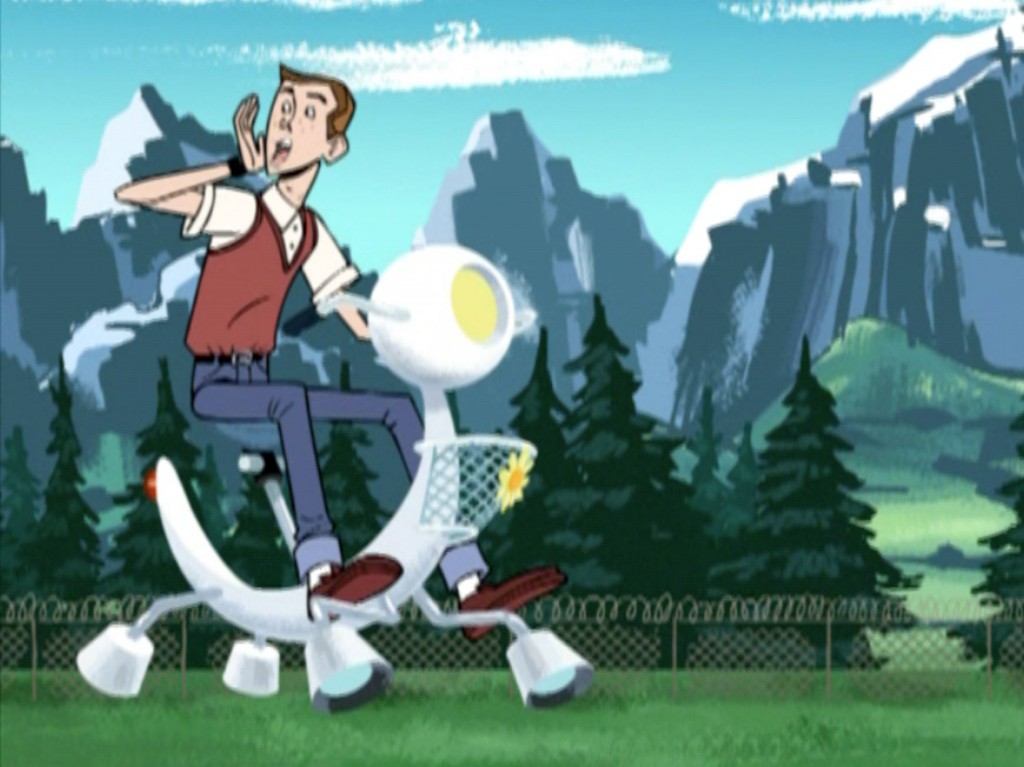
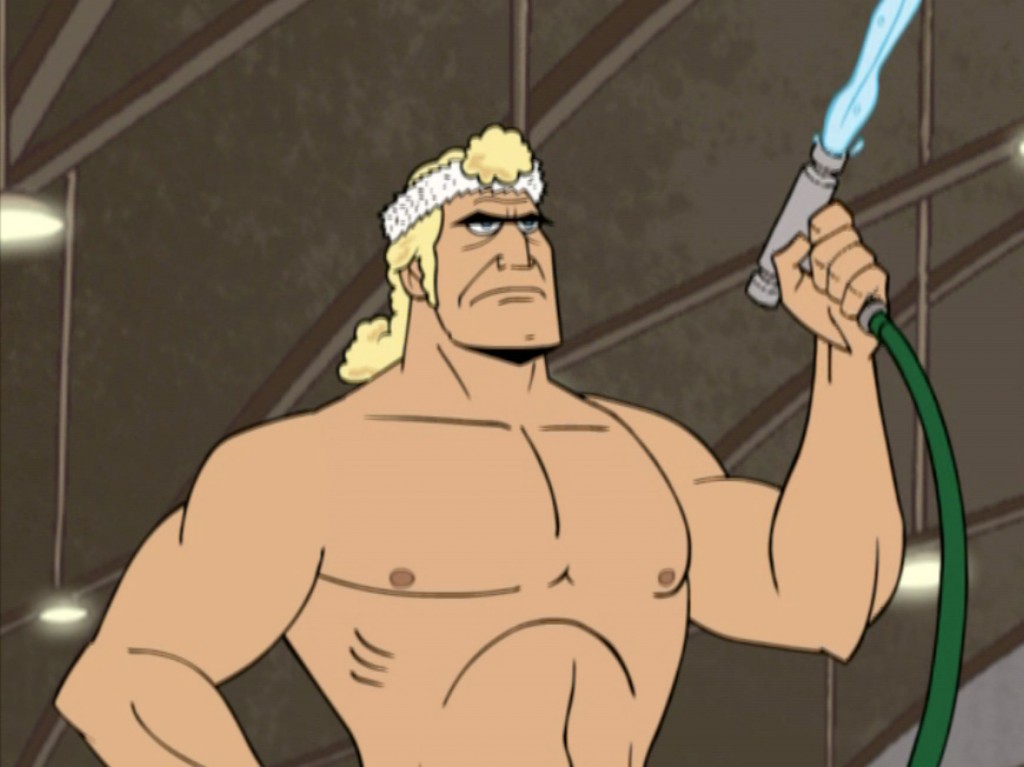
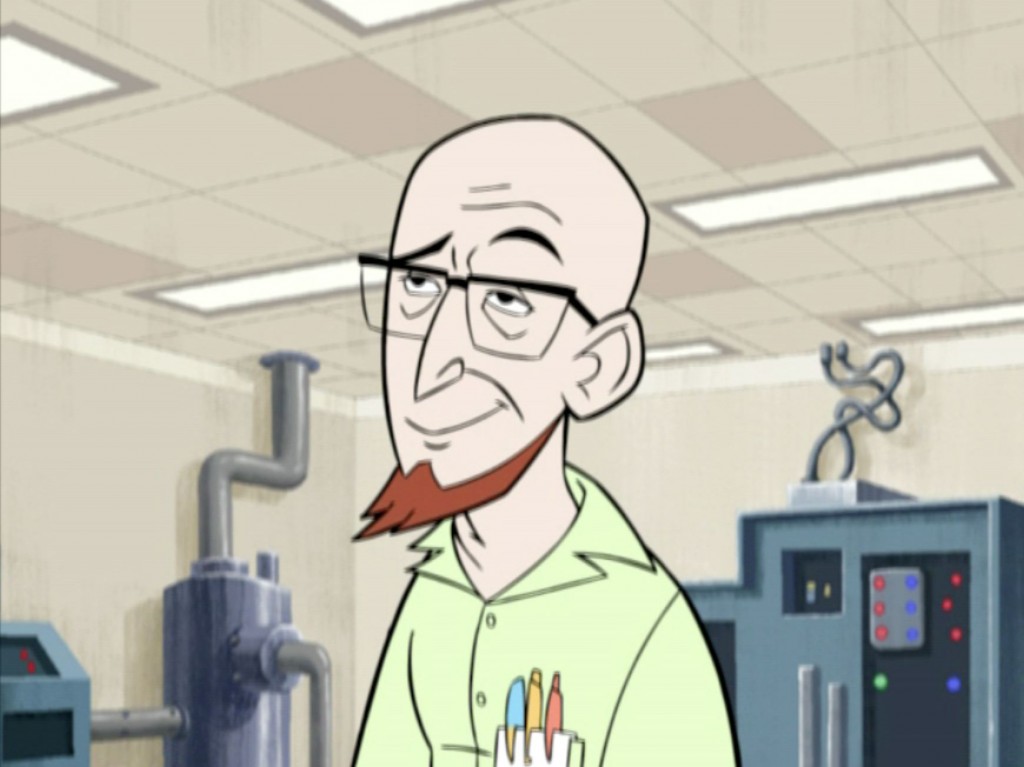
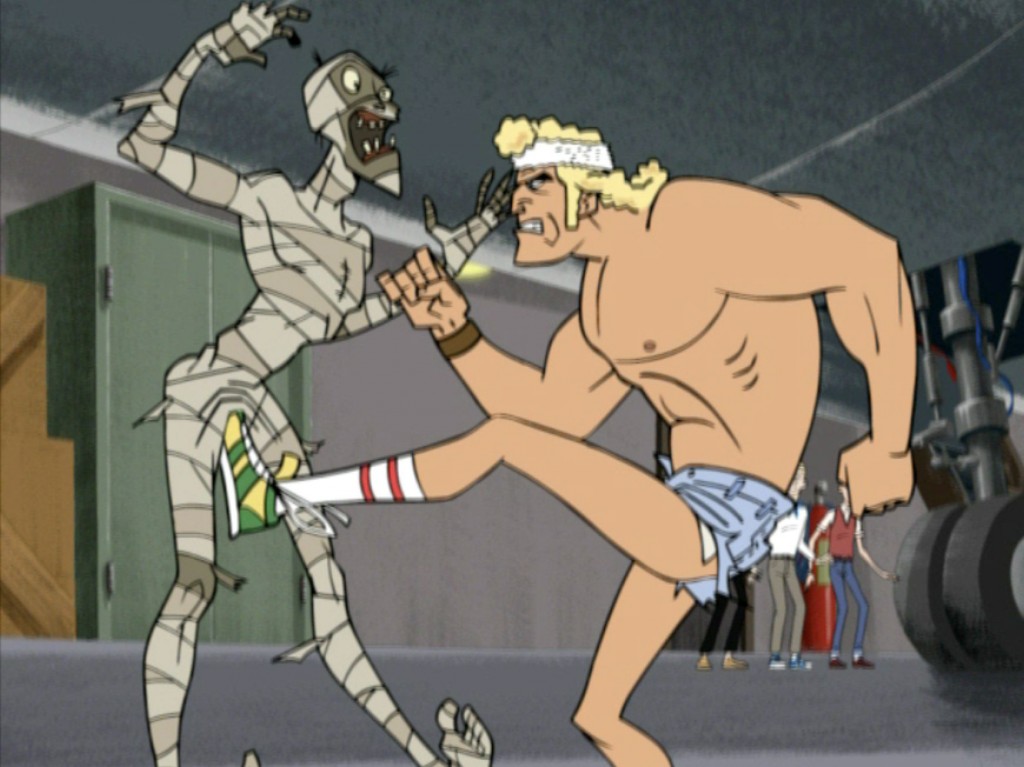
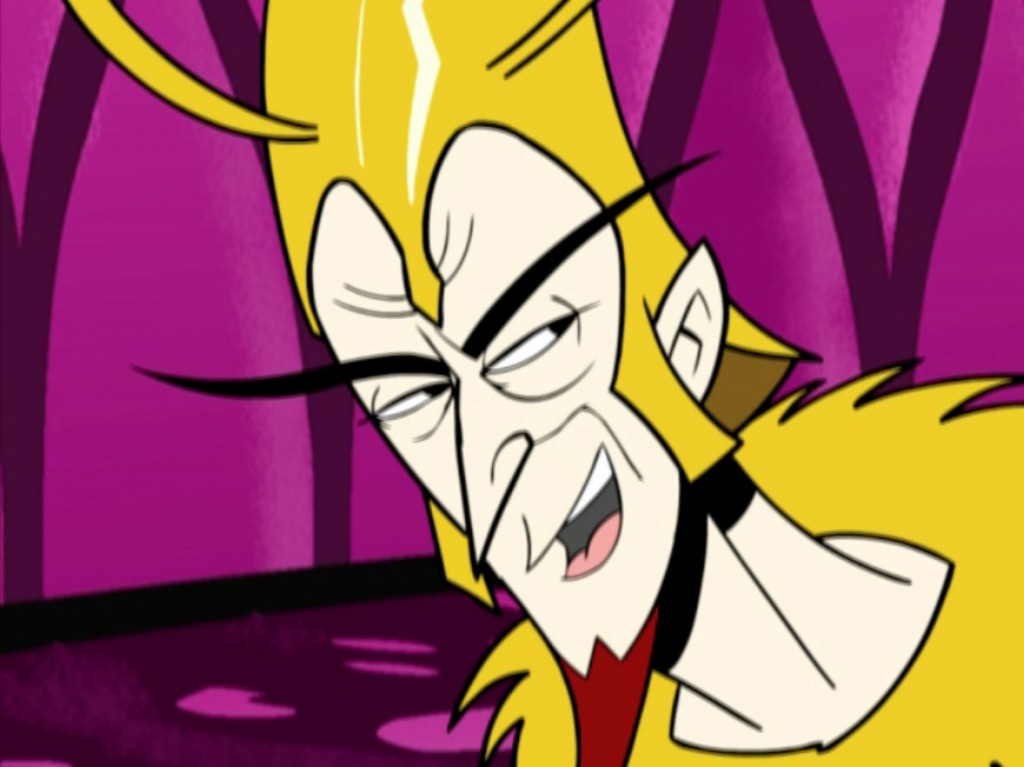
I’m excited for the return of your Venture Thoughts. It’s turned into companion reading for me.
Regarding the past and Venture Bros.:
I can’t help but think that wallowing in the past and how that hinders progress as complete people is also directed at the pop culture references and silly hero/villain games everyone in this show plays. As you said, this show takes place “today” but is fully clothed in a pastiche of pop culture from the past. So not only are these people haunted by their personal failures in the past, but it’s kept them in a sort of arrested development where they talk about and live out the pop culture of their youths.
I’m trying to think of a character who has completely let go of the pop culture of his youth and therefore was able to progress as a fuller person. Can’t think of one off the top of my head.
The only major character that comes to mind is Triana, who has her own past to deal with, but not her own pop-culture baggage.
Jonas Venture Jr. perhaps? It’s not clear that he had any pop-culture baggage, living inside Rusty all those years, but he somehow managed to learn English so presumably he had exposure to all the things that Rusty did.
But Jonas’s experience is limited to Rusty’s is it not? Or, because he’s the “better man” so to speak, perhaps he has a broader perspective than his brother.
Right, I meant, despite having had the same experience as Rusty’s for most of his life, he hasn’t held on to this baggage and thus has “progressed as a fuller person”.
According to the creators, the show’s primary theme is “failure”.
Hoo boy is it ever.
I always thought that Senzuri’s curing of his henchman’s smoking was intentional (especially as he incapacitates the boys later on), but I can see how it plays the way you describe it, too.
I’m going by Senzuri’s actions. He delivers a classic bad-guy send off, “You have served your master well,” then looks chagrined and disappointed when it turns out Kikai is still alive.
i really enjoy your writing, and i feel like you hit some themes of the show dead on. i will probably call it “the great gatsby filtered through johnny quest” to somebody else. however, i must disagree on the brock point: he cares very much about the boys! after his return in s4, he says that one of his great sacrifices while in hiding was being close to the boys without being able to tell them that they’re safe. that said, keep up the good work, and i look forward to the rest of your writing about this season!